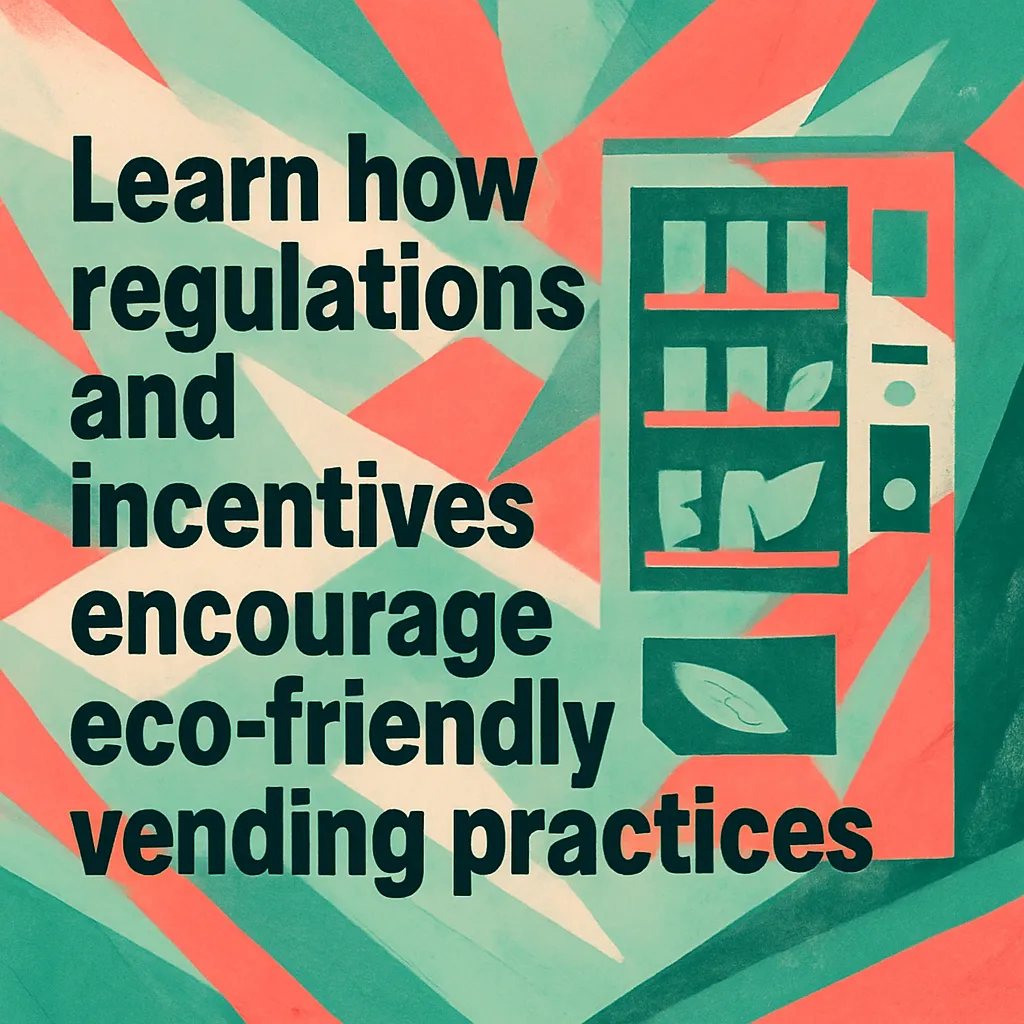Government Policies on Eco-Friendly Vending
Learn how regulations and incentives encourage eco-friendly vending practices.
Back to Eco Friendly Vending ResourcesLearn how regulations and incentives encourage eco-friendly vending practices.
Back to Eco Friendly Vending ResourcesGovernment policies are catalysts for greener vending, influencing everything from machine design to product selection, benefiting both the environment and consumers.
![]() Mandates for energy-efficient vending equipment
Mandates for energy-efficient vending equipment
![]() Incentives for operators to adopt sustainable practices
Incentives for operators to adopt sustainable practices
![]() Promotion of healthier, eco-conscious product offerings
Promotion of healthier, eco-conscious product offerings

Government policies play an increasingly vital role in shaping the landscape of eco-friendly vending. As environmental concerns escalate, national, state, and local entities are implementing a range of regulations and incentives designed to foster more sustainable practices within the vending industry. These policies often target key areas such as energy consumption, waste reduction, and the promotion of healthier, environmentally conscious products. For any business considering vending, understanding these policies is crucial for compliance and for leveraging available benefits.
One of the primary focuses of eco-friendly vending policies is energy efficiency. Governments often set standards for vending machines, encouraging the adoption of models with certifications like Energy Star. These standards aim to reduce the carbon footprint associated with machine operation. Beyond mandates, incentives such as tax credits or subsidies are frequently offered to businesses and operators who invest in upgrading to more energy-efficient equipment or integrating AI vending coolers. Such policies not only contribute to environmental protection but also offer long-term operational cost savings. The overarching goal is to shift the industry towards greener technology and responsible energy use.
Beyond energy, government policies significantly influence the types of products offered in vending machines and how waste is managed. Initiatives include promoting products with recyclable or compostable packaging, encouraging the inclusion of locally sourced goods, and sometimes even mandating healthy eating guidelines for vending in public spaces. This aligns with broader public health objectives and reduces the environmental impact of product lifecycle. Furthermore, policies may require providing easily accessible recycling facilities alongside vending machines to support proper waste separation and reduce landfill contributions. For businesses looking to implement a comprehensive eco-friendly strategy, understanding healthy snack options for vending machines is often a key component of compliance with these product-oriented policies.
Compliance with government policies is non-negotiable, particularly for vending services operating in public buildings or facilities. For example, federal and state agencies may have specific procurement guidelines that prioritize vendors offering sustainable solutions. Neglecting these policies can lead to penalties, while adherence can open new business opportunities and enhance a company's public image as a responsible entity. As the focus on climate change and sustainability intensifies, it is expected that these policies will become even more comprehensive, encompassing advanced recycling technologies, water efficiency, and stricter refrigerant regulations. Staying informed about these evolving policies, such as those covered in discussions around state regulations for healthy vending, will be essential for success in the eco-friendly vending market.
Government policies on eco-friendly vending include regulations and incentives aimed at encouraging the use of energy-efficient machines, sustainable products, and waste reduction practices in the vending industry.
Policies often promote energy efficiency through standards for new machines (e.g., Energy Star certification), financial incentives for operators to upgrade to more efficient models, and requirements for reduced energy consumption during off-peak hours.
Yes, some local, state, or federal programs offer tax credits, deductions, or grants for businesses that invest in certified energy-efficient or environmentally friendly vending equipment.
Policies may encourage or mandate stocking products with sustainable packaging, locally sourced items, organic options, or items that align with healthy eating guidelines to reduce environmental impact and promote public health.
Waste reduction policies often focus on promoting recyclable packaging, providing recycling bins alongside machines, and encouraging the use of reusable containers or refillable options to minimize landfill waste.
Many government buildings and public facilities have strict requirements for vending machines to meet specific energy efficiency standards, healthy product guidelines, or sustainability certifications as part of broader green initiatives.
Operators may face requirements to upgrade equipment, change product offerings, or implement new waste management practices, but they can also benefit from incentives and increased demand for eco-friendly services.
Yes, governments increasingly regulate the types of refrigerants allowed in vending machines to minimize their global warming potential, encouraging the use of natural or low-GWP alternatives.
You can research local government websites, contact your city or state environmental agencies, or consult with vending industry associations that track compliance requirements and incentive programs.
Long-term benefits include reduced energy consumption and operational costs, decreased environmental impact, improved public health through healthier options, and enhanced corporate social responsibility for businesses.